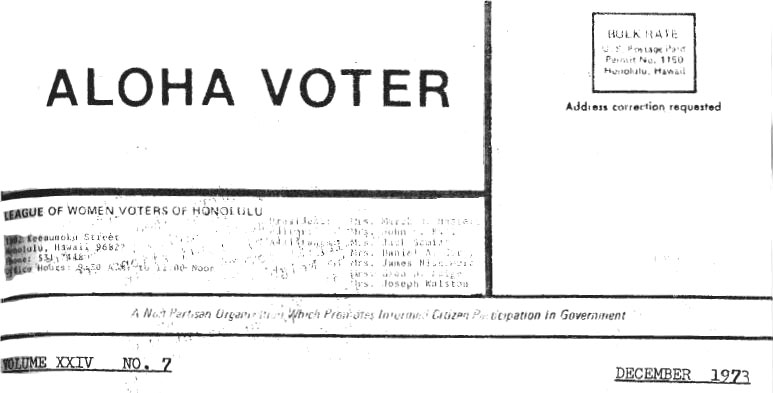 November 1973
November 1973December 1973
 January 1974
January 1974 November 1973 November 1973 |
Home
Newsletters
December 1973 |  January 1974 January 1974 |

 What Does it Really Take to Be Elected? What Does it Really Take to Be Elected? From the President (Diane Hastert) From the President (Diane Hastert) December Calendar December Calendar Money Bag Money Bag Board Bulletin Board Bulletin Learn to Lobby Wrap-up Learn to Lobby Wrap-up League Pulse League Pulse Summary of Memo from Lucy Wilson Benson, National President (Lucy Wilson Benson) Summary of Memo from Lucy Wilson Benson, National President (Lucy Wilson Benson) International Relations and Trade (Barbara Wiebenga) International Relations and Trade (Barbara Wiebenga) Multinationals (Barbara Wiebenga) Multinationals (Barbara Wiebenga) Whatever Happened to the Capitol Guide Service? (Gretel McLane) Whatever Happened to the Capitol Guide Service? (Gretel McLane) Water Pollution Control Water Pollution Control Report from the Hill Report from the Hill Action Alley Action Alley |
Multinationals"Everywhere at Home, Home Nowhere" Ronald Segal from the Center Magazine, May/June 1973 (from a book on the world monetary crisis to be published)... The operations of the modern multinational corporation involve so many countries that it is becoming questionable whether they have any real home at all. Indeed much of their profit success is based on their ability to exploit the world market and manipulate the world monetary system with little regard to the consequences to their home nation or the world economic health. The MNC's have great flexibility in avoiding profit lessening conditions in any specific country. If the business environment is negative, they can move operations and capital out. Therefore, they keep to a minimum the costs of taxes, pollution controls and labor. Much of their impact lies in their activities in the world monetary market. With the transfer of their enormous liquid funds from one currency to another, they can swamp the international money market. The very process of their speculation can cause a monetary crisis--a currency predicted to become weak does indeed become so as they accelerate payments out of it. Governments accommodate their own MNC's with subsidies, protective tariffs, sanctioned cartel agreements and whole or part government ownerships. Monetary exchange controls have proved largely ineffectual in controlling speculation because the deference to authorities of multinational banks is overwhelmed by their fear of losing mammoth MNC accounts. Thus the MNC combines its flexibility, its tremendous size and the support from its government to rise above the national communities and become a state in itself owing Allegiance to its own objectives. The MNC's have their effect on world inflation. They so dominate the products and services in which their business is concentrated that they are able to weaken competition. The Organization of Economic Cooperation and Development, a capitalist institution, sees a relationship between rising prices and MNC's and feels that the competition created by lowering trade barriers is undermined by international mergers and financial links between companies in different countries. It emphasized that although the MNC's have been a major factor in high productivity, their rise provides increasing scope for monopolistic practices. "The Multinational Company--A Positive Force" O.N. Miller, Chairman of the Board, Standard Oil Co., Cal. from the Bulletin, their quarterly magazine.... There has been strong criticism directed against American MNC's. Most of the charges are leveled at labor-intensive companies for taking jobs away from American workers, among other things. Oi1 companies are not labor-intensive, but would be subject to any laws against MNC's. There are 300 U.S. MNC'S with 5,200 overseas subsidiaries. We think the MNC's are a major contributor to the nation's strength. After WII and the historic Marshall Plan the MNC's pioneered the discovery of raw materials, advancement of technology, management techniques and development of new markets. They helped developing nations achieve economic stability and increased self-sufficiency. The firms were operating beyond their borders long before U.S. companies went overseas. A century ago the U.S. relied on capital, skills and technology from Europe to hasten our industrialization. To remain strong, a country must participate in the increasingly interdependent international marketplace. Economic isolationism would undermine America's leading position in the Foreign Free World, and seriously impair our domestic economy and destroy the foundation of our influence in world affairs. MNC's help to relieve the deteriorating trade balances by their sizable earnings on foreign investments. The number of jobs that MNC's provide at home continues to grow at a faster rate than the average of domestic industry as a whole. Establishing plants abroad is done to expand foreign markets, not to obtain cheap labor and tax breaks. 75% of U.S. investment in manufacturing abroad is in Canada and Europe, where wages are generally not that much lower than those in the U.S. Most investment abroad is in capital intensive, not labor intensive industries. MNC's have also been accused of being currency manipulators, contributing to international monetary crises. The U.S. Tariff Commission has recently called attention to the Substantial world-wide total of short-term liquid assets controlled by these firms, banks and certain government institutions. It notes that shifting of only a small portion. The Commission concludes, however, that most MNC's are innocent of "destructive, predatory motives" in their currency dealings. MNC's are in an unique position to promote strong bonds among nations of the world. Through them citizens from many nations can work together toward political and economic stability. Barbara Wiebenga |
 November 1973 November 1973 | Top Home Newsletters |  January 1974 January 1974 |